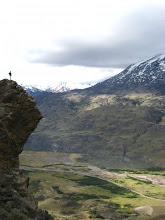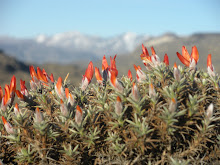
La Vizcacha, a rodent of significant size, was on the list of animals I had yet to see in the wild. It is a strange creature resembling which can only be described as a cross between a 4-H show rabbit and a Chinchilla and is about the size of a really fat housecat. They have long, brownish-red fur and are equpped with a long squirrel like tail. Carlos, my appointed guardian and boss during the day, led me to a spot that promised to be plentiful with vizcachas. They live in the rocky crags of the Andes, especially on the western slopes where they can sun themselves at their hearts desire.
As we searched the slopes from the base of the mountain, I was slowly losing hope of seeing one. We had walked 2 miles from the Estancia, and there were none to be found...at first. We patrolled the edge of the slope for a while until out of nowhere, one appeared. We looked at it for about a minute before we decided we needed a more picturesque view. There was about a 70 or 80 degree slope covered in bush-sized thorn thickets between us and the vizcachas. The rocks were jagged and they were completely unstable. They kind of had a flakeyness about them with patches of solid granite in between. One wrong grip or foot placing meant the other person was in for quite the trip back, you know, carrying the body and all.
The vizcachas seemed fairly nonchalant about us being there, but everytime we got almost within picture range, they would dissapear into the side of the mountain. Suddenly, vizcachas were emerging from under every rock and from within every crack, but we still couldnt get within range of our digital cameras. We split up into a high road team and a low road team so that if one person saw one from below, the other could approach it from above, hopefully without being noticed by the momentarily distracted animal. It became very frustrating at times. The animal would be out, then the animal would hide; Another would come out, the hidden animal would appear, then both would hide. Finally, I took a chance and climbed above one that had been hidden for a while to see if it might have appeared. Sure enough, there it was, but it didnt move this time. It just sat there because it finally realized we couldnt quite get to it. But this time, we were in range with our cameras. In fact, at one point, I was within three feet of a sunbathing vizcacha.
As we searched the slopes from the base of the mountain, I was slowly losing hope of seeing one. We had walked 2 miles from the Estancia, and there were none to be found...at first. We patrolled the edge of the slope for a while until out of nowhere, one appeared. We looked at it for about a minute before we decided we needed a more picturesque view. There was about a 70 or 80 degree slope covered in bush-sized thorn thickets between us and the vizcachas. The rocks were jagged and they were completely unstable. They kind of had a flakeyness about them with patches of solid granite in between. One wrong grip or foot placing meant the other person was in for quite the trip back, you know, carrying the body and all.
The vizcachas seemed fairly nonchalant about us being there, but everytime we got almost within picture range, they would dissapear into the side of the mountain. Suddenly, vizcachas were emerging from under every rock and from within every crack, but we still couldnt get within range of our digital cameras. We split up into a high road team and a low road team so that if one person saw one from below, the other could approach it from above, hopefully without being noticed by the momentarily distracted animal. It became very frustrating at times. The animal would be out, then the animal would hide; Another would come out, the hidden animal would appear, then both would hide. Finally, I took a chance and climbed above one that had been hidden for a while to see if it might have appeared. Sure enough, there it was, but it didnt move this time. It just sat there because it finally realized we couldnt quite get to it. But this time, we were in range with our cameras. In fact, at one point, I was within three feet of a sunbathing vizcacha.
Our talking, limited as it is, pretty much ceased to exist on the way back. We were both tired from all the spotting, and climbing after the elusive vizcachas. Now, we are both veteran Vizcacha hunters, or in español: Vizcachadores.
From the perimeter of civilization
James Bowden





